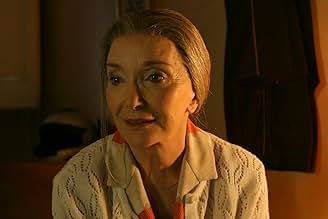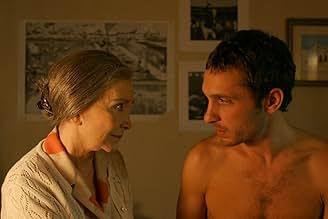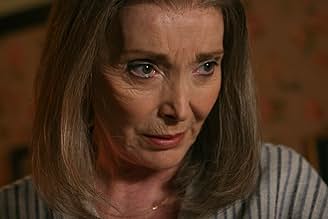Ajouter une intrigue dans votre langue6 characters--contemporary archetypes of urban solitude--in an old Barcelona building: an old husband and wife, her sister, and 3 tenants: a teacher of French, a young ex-footballer, now sec... Tout lire6 characters--contemporary archetypes of urban solitude--in an old Barcelona building: an old husband and wife, her sister, and 3 tenants: a teacher of French, a young ex-footballer, now security guard, and a pregnant Latin American girl.6 characters--contemporary archetypes of urban solitude--in an old Barcelona building: an old husband and wife, her sister, and 3 tenants: a teacher of French, a young ex-footballer, now security guard, and a pregnant Latin American girl.
- Récompenses
- 2 victoires et 9 nominations au total
Histoire
Le saviez-vous
- Bandes originalesCant del Barça
(uncredited)
Music by Manuel Valls Gorina
Lyrics by Josep Maria Espinàs and Jaume Picas
Performed by Pablo Derqui
Commentaire à la une
Rosa and Ramon are an old couple. They own an old building. They rent rooms. The renters are single persons.
The film is simply structured as five lengthy dialogues over the course of an evening. The first three are between either Rosa or Ramon and one of the renters. The fourth is between Rosa and a relative that does not live in the building. The fifth is an epilogue where Rosa and Ramon engage in revelations that answer some of the questions raised by the previous dialogues.
It does not take long to find out that the couple is evicting all the renters. But why?
One of the renters is a middle-aged woman that gives private French language lessons in her apartment. The first dialogue is between her and Ramon. The subject is eviction but as is typical of unhurried dialogues, topics drift into others with facility. Even a bit of opera, La Boheme, comes into play via a radio program.
Rosa is the one to inform a second renter, a man who works as a night security guard in a shopping mall, that he is to leave the premises by Monday (as all the others, by the way). Similarly to the previous dialogue, this one also meanders meaningfully. In the same way that La Boheme was a crucial tidbit in the first dialogue, now it's a gun.
The third renter is an Argentinean woman who works in a restaurant. If the pattern is not apparent by now, it should be when you see Ramon giving the woman the bad news of eviction. Yet this gender hetero-matching is about to be subverted in this and especially the following dialogues.
The fourth dialogue is more enigmatic. A man is called to have a dialogue with Rosa. I won't say anything, except that you should trust your first impression.
The fifth and final dialogue is between Rosa and Ramon. We are coming to the end of the opera (on the radio). It's time for some answers, even some magical dramatics and costumes. The neat gender equation of the first two, not quite three, dialogues is upturned. Some truths are averred, others are hinted. Curtains. Bravo!
The delight in watching this film comes from enjoying the dialogues, observing how topical transitions occur, picking cues out of small talk and appreciating fine actors deliver their lines. The mystery elements are icing on the cake.
The reason for the title is twofold. First, it takes place in Barcelona. Second, the dialogues are complemented by grainy images of locations in that city, such as the famous Sagrada Familia, when they are mentioned. It is a technique that is also used a few times throughout to give image to what's being said in the dialogues. It helps in breaking up the otherwise uniform visual texture of the brownish interior scenes of the building's rooms that are the only venues for the dialogues.
My single, major complaint is poor lipsynch. Evidently the voices were recorded in a studio. The audio is therefore excellent. But seeing lips move not in harmony with what is being said is profoundly annoying.
The film is simply structured as five lengthy dialogues over the course of an evening. The first three are between either Rosa or Ramon and one of the renters. The fourth is between Rosa and a relative that does not live in the building. The fifth is an epilogue where Rosa and Ramon engage in revelations that answer some of the questions raised by the previous dialogues.
It does not take long to find out that the couple is evicting all the renters. But why?
One of the renters is a middle-aged woman that gives private French language lessons in her apartment. The first dialogue is between her and Ramon. The subject is eviction but as is typical of unhurried dialogues, topics drift into others with facility. Even a bit of opera, La Boheme, comes into play via a radio program.
Rosa is the one to inform a second renter, a man who works as a night security guard in a shopping mall, that he is to leave the premises by Monday (as all the others, by the way). Similarly to the previous dialogue, this one also meanders meaningfully. In the same way that La Boheme was a crucial tidbit in the first dialogue, now it's a gun.
The third renter is an Argentinean woman who works in a restaurant. If the pattern is not apparent by now, it should be when you see Ramon giving the woman the bad news of eviction. Yet this gender hetero-matching is about to be subverted in this and especially the following dialogues.
The fourth dialogue is more enigmatic. A man is called to have a dialogue with Rosa. I won't say anything, except that you should trust your first impression.
The fifth and final dialogue is between Rosa and Ramon. We are coming to the end of the opera (on the radio). It's time for some answers, even some magical dramatics and costumes. The neat gender equation of the first two, not quite three, dialogues is upturned. Some truths are averred, others are hinted. Curtains. Bravo!
The delight in watching this film comes from enjoying the dialogues, observing how topical transitions occur, picking cues out of small talk and appreciating fine actors deliver their lines. The mystery elements are icing on the cake.
The reason for the title is twofold. First, it takes place in Barcelona. Second, the dialogues are complemented by grainy images of locations in that city, such as the famous Sagrada Familia, when they are mentioned. It is a technique that is also used a few times throughout to give image to what's being said in the dialogues. It helps in breaking up the otherwise uniform visual texture of the brownish interior scenes of the building's rooms that are the only venues for the dialogues.
My single, major complaint is poor lipsynch. Evidently the voices were recorded in a studio. The audio is therefore excellent. But seeing lips move not in harmony with what is being said is profoundly annoying.
Meilleurs choix
Connectez-vous pour évaluer et suivre la liste de favoris afin de recevoir des recommandations personnalisées
Détails
Box-office
- Montant brut mondial
- 182 030 $US
- Durée1 heure 30 minutes
- Couleur
- Mixage
Contribuer à cette page
Suggérer une modification ou ajouter du contenu manquant

Lacune principale
By what name was Barcelona (un mapa) (2007) officially released in India in English?
Répondre





















